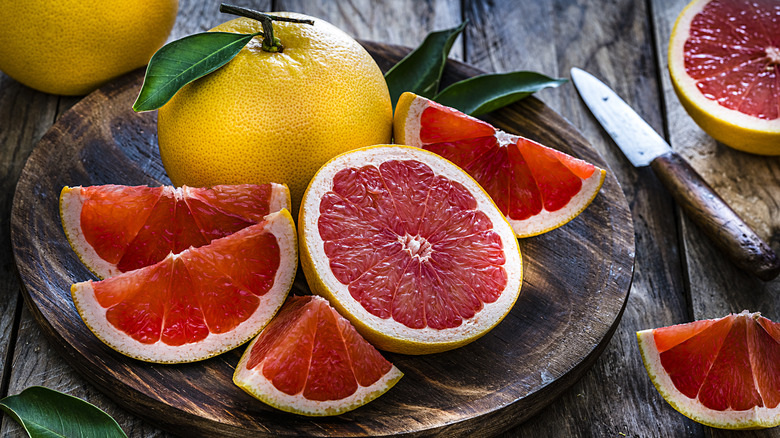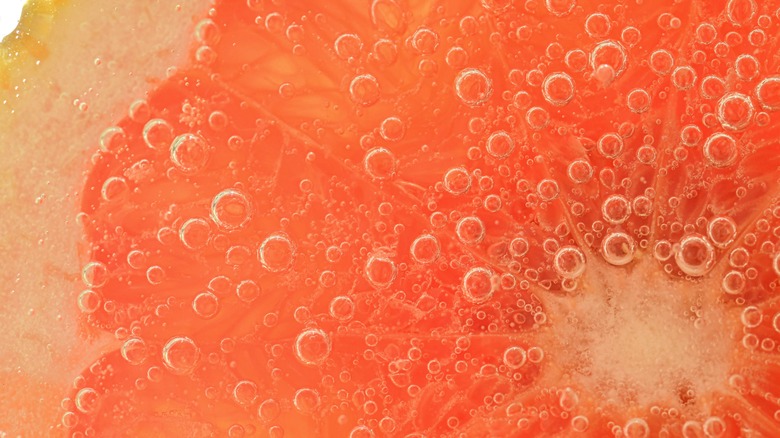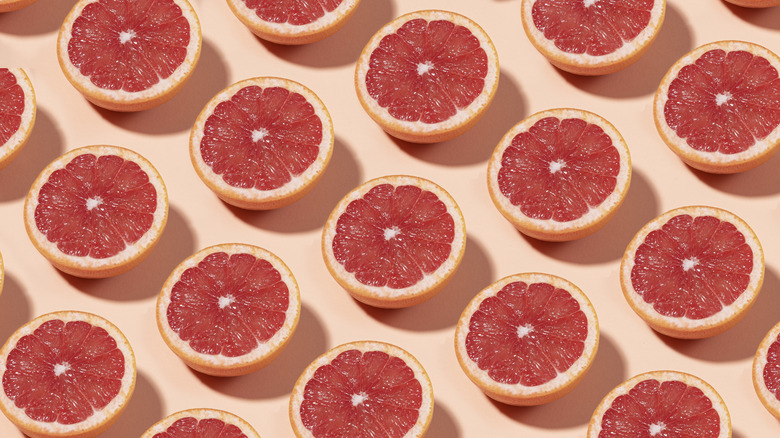Yes, You Can Use A Juiced Grapefruit To Clean Kitchen Grime
Grapefruits are beautiful things; they're like oranges with attitude. Sure, there's some sweetness there, but it's balanced with an acerbic zest. You could be excused for composting a grapefruit once you've juiced it, but hold up: These things make a pretty great household cleaning agent, and not just because they smell so good. Grapefruits are naturally acidic and have been shown to possess antibacterial and antimicrobial properties. When mixed with other acids like distilled vinegar and abrasives like salt or baking soda, grapefruits can complete many household cleaning jobs without harsh chemicals, including getting rid of grime.
Should you even need one, let this be a reason to have more grapefruit in your life. For starters, they're incredibly healthy — packed with fiber, antioxidants, vitamins, and minerals — and have one of the greatest calorie-to-nutrient ratios around. Not only are grapefruits good for your skin and heart health, but they can also lower your risk of kidney stones. That's a pretty good amount of value added to your morning dose of citrusy vitamin C — and anyway, you should be squeezing fruit juice at home to avoid ingesting toxic metals.
Grime-fighting components
Got a grimy countertop, cooktop, or sink? Simply coat the cut end of your juiced grapefruit with salt and use it as a scrub — the problem is not only eliminated but deodorized. Why does this work? Because grapefruits are acidic little devils, with a pH between 2.9 and 3.3 (for reference, pH-neutral water has a level of 7; a substance with any number lower than that is considered acidic). Grapefruits are so acidic that, like lemons, sustained contact with them can wear away tooth enamel. Don't keep them in contact with your teeth if you have sensitivities.
You can make a more powerful all-purpose cleaner by combining grapefruit peel (without the white pith) and white vinegar (which it turns out has all kinds of surprising household uses) and leaving the bottled mixture to sit in the dark for about 10 days. Vinegar is more acidic than grapefruit (but still not as much as lemons!), but the peels will lend that unbeatable fresh scent. (You can also include some of the fruit's juice in that mixture if you'd like.) Add some Borax to your grapefruit and vinegar solution for tougher jobs on grimy floors or mildewy showers.
Anti-everything, in a good way
Grapefruits are so good at cleaning that an extract made from their seeds and pulp (known as GSE, or grapefruit seed extract) has been shown to reduce the population of pathogens like microbes, fungus, bacteria, and viruses — to the extent that GSE is used as a commercial preservative for whole or freshly-cut vegetables. This is partly thanks to the antioxidant properties of grapefruit's many polyphenolic compounds, few of which are pronounceable but all of which are beneficial.
Polyphenols have also been shown to protect against the development of certain cancers as well as reducing the risk of diabetes and some cardiovascular and neurodegenerative diseases. If you have Type 2 diabetes, it's not a bad thing to enjoy grapefruits, as they're also high in carbohydrates, which slow the breakdown of sugar — definitely choose them over potato chips, candy, or other high-sugar, low-fiber snacks.


